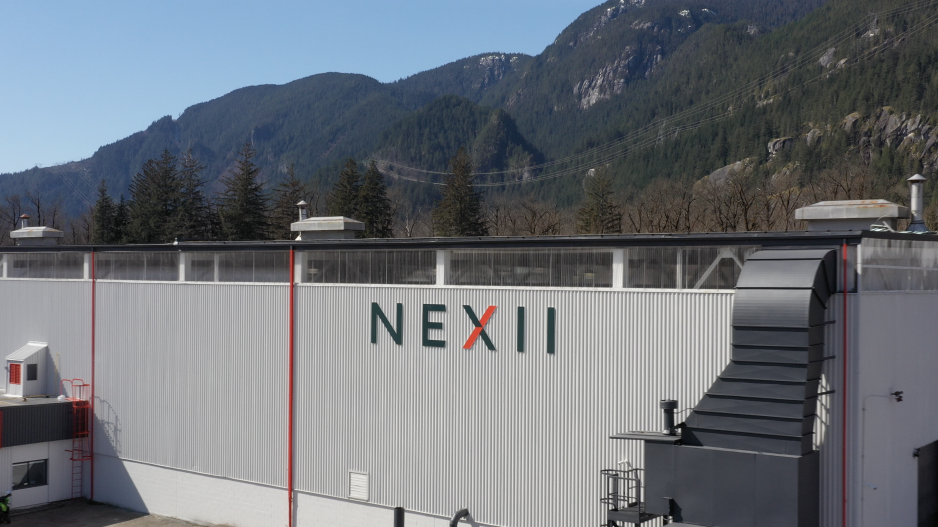B.C. has just built itself yet another “unicorn.”
Nexii Building Solutions Inc. revealed Wednesday it’s become at least the 10th company in the province to attain a valuation of at least US$1 billion since December.
The Vancouver-based construction firm is best known for developing a building material known as Nexiite, which can be used as a low-carbon alternative to cement and concrete for floors, walls and roofs.
The company has been striking deals with quick-serve restaurants like A&W Food Services of Canada Inc. and Starbucks Corp. (Nasdaq:SBUX) to provide materials that can reduce buildings’ emissions by 30% in some cases. Two manufacturing plants are in operation in North America and six others are under development.
Nexii executive vice-president Gregor Robertson told BIV he was “thrilled” by the company reaching unicorn status after a $45-million equity investment that set its valuation at $1.55 billion (US$1.23 billion).
“It speaks to the incredible potential we have in the marketplace,” he said, adding the company has also secured debt financing this year with more details to come imminently.
“We're very focused on growth and scaling across North America currently before we go global.”
Robertson said the company is the fastest in Canada to ever reach unicorn status and, to date, Nexii has raised $125 million through a mix of private placements and equity investments. The newly minted unicorn has about 1,000 shareholders, including employees, clients and suppliers.
The latest offering — the company’s sixth since its founding in late 2018 — was led by Honeywell International Inc. (Nasdaq:HON) with participation from Trane Technologies PLC and other strategic partners.
Honeywell and Trane are also suppliers for Nexii, providing it everything from building-management systems to HVAC systems for structures the Canadian company builds.
Beyond small quick-service restaurants, Nexii is also embarking on construction efforts for mid-size buildings such as the new Marriott hotel in Nanaimo.
“We anticipate huge growth with that product in mid-to-high-rise buildings, which need to be more far more energy efficient,” Robertson said, adding the company also sees opportunities with multi-unit residential buildings.
The surge of unicorns to emerge from B.C. over the past year is unprecedented for the local economy.
David Raffa, president of Valeo Corporate Finance Ltd., said the local tech ecosystem is benefitting from private equity firms swimming in cash amid the pandemic, while credit markets are wide open and interest rates are at record lows.
“You build a dam dependent on a river and the water is piling up, piling up, piling up. Then the dam bursts. And so that’s what happened,” Raffa, whose Vancouver-based firm provides services for mergers and acquisitions and initial public offerings, told BIV in April.
Access to top-tier universities and the large talent pool paid in Canadian dollars at lower comparable salaries than their American counterparts have been particularly enticing, he added.
Brent Holliday, CEO of Vancouver-based Garibaldi Capital Advisors Ltd., said the local tech sector had been held back to a certain degree in years past owing to the lack of available talent in the city.
“Getting big financings in companies like Hootsuite [Inc.], BuildDirect[.com Technologies Inc.], etc., 10 years ago helped fuel a broader talent pool we have,” he told BIV in May.
Victoria-based blockchain tech company Blockstream Corp. Inc. was the latest unicorn to emerge from the province prior to Nexii, having raised US$210 million from investors last month and attaining a $3.2-billion valuation as a result.
Before that, companies specializing in everything from geofencing to non-fungible tokens; from COVID-19 treatments to legal-tech products, have been leading the explosion of unicorns since December 2020.
“Vancouver is a rising star in the tech world globally, and we've attracted amazing talent from around the world and incubated some incredible technologies that are now breaking through,” said Robertson, the city’s former mayor.
“We're seeing companies like Nexii providing market solutions that are competitive and ultimately will save building owners money with lower energy costs and more durable, climate-resilient buildings.”
Cement has a large carbon footprint due to its energy intensity. About 900 kilograms of CO2 is produced for every tonne of Portland cement, according to a 2018 study published in Science Direct.
Materials that have similar properties as cement, but lower carbon intensities, are being pursued as a way to decarbonize the construction sector.
And as heat domes and wildfires have hit B.C. hard over the summer, Robertson said there’s an enormous market demand for lower-carbon buildings.
“Uptake of electric vehicles is off the charts compared to green buildings and that has to change,” said Robertson.
—With a file from Nelson Bennett




